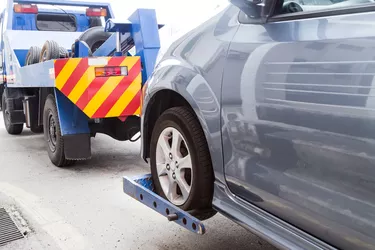
When you're unable to make your car payments or otherwise meet the terms of the contract you signed with your auto lender, your vehicle is subject to repossession. But just as lenders are entitled to collect collateral when a consumer fails to pay, borrowers have rights that Michigan courts have upheld.
Self-Help Repossession
Video of the Day
Michigan is a self-help repossession state. If you default on your contract with your lender, typically by failing to make payments, the lender can come take your car without suing you in court first or even giving you notice. Michigan has adopted the Uniform Commercial Code that allows this as long as the lender or its agent doesn't breach the peace when taking your vehicle. Lenders and their agents can't take certain actions when repossessing vehicles.
Video of the Day
- The repossessor can't enter a structure, such as your garage, even if the garage is unlocked.
- He can't trick you into giving him access to your car, for example, by misrepresenting who he is or why he wants to see your vehicle or know where it is.
- He can't be rude or threatening. He can't provoke you into losing your temper and can't use physical force against you.
- He must remove the vehicle quietly and without disturbance.
Tip
Michigan’s Motor Vehicle Sales Finance Act prohibits your lender from contractually requiring your agreement not to sue or take action if your vehicle is taken illegally or the lender’s agent breached the peace. If you believe something objectionable occurred, seek legal advice.
The Right of Redemption
Assuming the repo agent lawfully takes your vehicle, you have 15 days to get it back. But unless you file for Chapter 13 bankruptcy protection, Michigan law only provides one way you can do this – by redeeming the car. This involves paying off the loan in its entirety, in addition to any repossession fees assessed against you.
Deficiency Balances
According to the American Recovery Association, it's "generally required" that your lender notify you of when and where your vehicle will be sold after it's repossessed. Michigan courts have taken a stand against lenders that fail to do this, preventing them from collecting any deficiency balance from you after the sale. In most cases, if your car ultimately sells for less than your loan balance, your lender can sue you for the difference, particularly if this is provided for in your contract. But the Michigan Court of Appeals has ruled that creditors are barred from collecting deficiency balances if they fail to notify borrowers of when and where repossession sales will take place.
Tip
If you don't receive notification of your vehicle's sale after repossession, consider speaking with an attorney. The Consumer Law Newsletter indicates that a good lawyer might be able to make a claim for damages: You weren’t notified, so you had no ability to attend or otherwise try to prevent the vehicle from being sold at a negligible price.